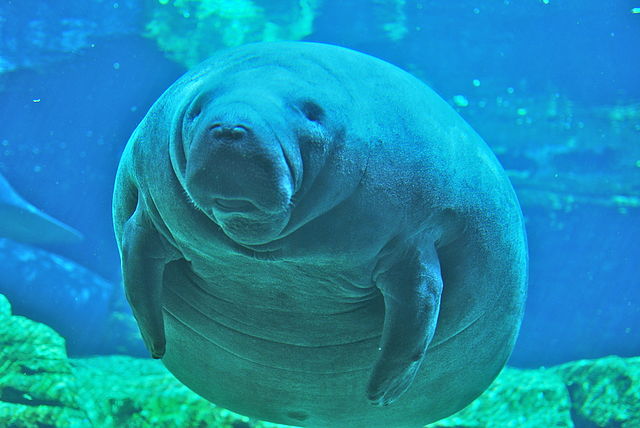The Importance of Manatee Farts

Fish, sharks, whales, dolphins — they’re all really good swimmers. And that makes a lot of sense because they live in water, and if you live in water, you need to be able to swim well to do, well, just about everything. Your food, your friends, and whatever you do for fun are all underwater, so you best be able to get around.
The good news for most of those creatures is that, to varying degrees, they’re built for underwater living. Fish and sharks have gills and can breathe underwater; whales and dolphins, being mammals, need to come to the surface, but they have respiratory systems that allow them to maximize their time underwater. But put breathing aside for a moment, because there’s more to being an undersea creature than that. You also need to be able to regulate your depth. If you’re too buoyant, you’ll float to the surface; if you’re not buoyant enough, you’ll sink toward the sea floor. And if your friends or your meals are somewhere in between, that’s a problem.
But, again, most swimming creatures are built for this. Most fish — particularly those with denser, bony skeletons — have an internal organ called a “swim bladder,” which is basically just a big sack of gas that allows them to stay at whatever depth is appropriate without having to spend energy swimming. Fish with cartilage-based skeletons (sharks, for example) and mammals like dolphins and whales don’t have swim bladders, but that’s okay; they can regulate their depth simply by swimming; their pectoral (side) fins work similar to the wings of birds and airplanes, creating lift. And because those creatures are always in motion, hunting down their next meal (or in the case of dolphins, doing fun dolphin things), not having a swim bladder is not really a big deal.
Unless you’re a manatee, sometimes called a “sea cow,” as seen above. Manatees are special — unlike fish and sharks, they’re mammals, and unlike whales and dolphins, they’re vegetarian. And that’s a bad combination. Vegetation doesn’t move much, so you have to stay where you are to eat, which removes airplane-like lift from your repertoire of buoyancy strategies. Being a mammal, you don’t have a swim bladder, so that’s out. You need to be able to drop to deeper depths upon command. The easiest way to do that is to let some air out of your body, so that’s what you do.
As the Columbus Zoo explains in this video, when manatees want to dive for a meal, they fart.
It’s a rather efficient (albeit hardly elegant) solution. Manatees can weigh nearly 600 kilograms (1,300 lb) and they eat about 10% of their body weight in vegetation each day; consuming that much plant material, as anyone who has ever eaten a lot of salad can attest, is going to lead to a good amount of gaseous bloat. The more manatees eat, the more gas they store up, and the more gas they store up, the more they float to the surface. When it’s time to eat again, they just let a big one rip and wait a bit; before they know it, the hungry manatee is now descending back toward where its next meal is growing.
Of course, any flatulence-based motion system has a built-in problem: what do you do when you’re too backed up to fart? A 2000 study on manatee biology noted that “constipated manatees are often unable to dive” and therefore are imperiled. Thankfully, that’s an issue humans can help with. First, it’s pretty easy to see if a manatee is constipated as their tails tend to float higher than the rest of their bodies. And second, manatee constipation is an easy thing to fix: you just give them a laxative. Per the study, “after treatment with a laxative, the animals expelled substantial volumes of gas, regained their buoyancy control, and then exhibited normal locomotory movements.”
So next time you see a manatee toot, don’t be offended. For them, farting isn’t just sophomoric triviality — it is literally a life or death decision.
Bonus fact: According to the book “Does It Fart?” (yes, that’s a real book), most animals fart, including ferrets. But unlike the other animals that fart, ferrets don’t seem to know that they’re farting until they’ve already passed gas. Per the book, via Mental Floss, “[ferret] owners often report a confused look on their pet’s face in the direction of their backside after they audibly pass gas.”
From the Archives: Veg-Jaws-Tarian: The one and only vegetarian shark.
